
Topics
As Iran agrees to allow UN inspectors into the country to examine suspected nuclear sites, Israeli Defense Minister Shaul Mofaz has begun publicly discussing a possible Israeli attack on Iran to destroy Iran’s nuclear capability. And two weeks ago, evidence emerged indicating Pakistan might have given Iran and North Korea technology to enrich uranium. [includes transcript]
On Thursday, Iran agreed to allow UN inspectors into the country to examine suspected nuclear sites. The announcement came one day before the Libya announced it would scrap its arsenal of weapons of mass destruction.
Iran signed a portion of the nuclear non-proliferation treaty and vowed that its atomic program was for peaceful purposes.
The U.S. praised the move but said it was only a first step.
Iran’s claim that its nuclear program is for peaceful purposes contradicts reports coming out of Pakistan. Two weeks ago the Pakistani government detained three top nuclear scientists after evidence emerged that indicated they might have given Iran and North Korea technology to enrich uranium.
In Israel, Haaretz is reporting that the Defense Minister Shaul Mofaz has begun publicly discussing a possible Israeli attack on Iran to destroy Iran’s nuclear capability.
The Defense Minister first discussed the attack on Israel radio. Last month a top official in Israel’s spy agency Mossad described Iran’s nuclear program as the biggest threat to Israel since its 1948 creation.
- Prof. Ervand Abrahamian, Middle East and Iran Expert at Baruch College, City University of New York. He is the author of several books on Iran including Khomeinism: Essays on the Islamic Republic (University of California Press, 1993) and The Iranian Mojahedin (Yale University Press, 1984).
Transcript
AMY GOODMAN: I wanted to, in continuing to talk about nuclear politics, to switch gears for a moment because on Thursday, Iran agreed to allow U.N. inspectors into the country to examine suspected nuclear sites there. The announcement came one day before Libya announced it would scrap its arsenal of weapons of mass destruction. Iran signed a portion of the Nuclear Non-proliferation Treaty and vowed that its atomic program was for peaceful purposes. The U.S. praised the move but said it was only a first step. Iran’s claim that it’s nuclear program is for peaceful purpose contradicts reports coming out of Pakistan. Two weeks ago the Pakistani government detained three top nuclear scientists after evidence emerged that indicated they might have given Iran and North Korea technology to enrich uranium. In Israel, the newpapers Haaretz is reporting that the Defense Minister has begun publicly discussing a possible Israeli attack on Iran, to destroy Iran’s nuclear capability. The Defense Minister first discussed the attack on Israeli radio. Last month a top official in Israel’s spy agency Mossad described Iran’s nuclear program as the biggest threat to Israel since its creation in 1948. In addition to Susan Cohen and Andrew Lycett, author of “Qaddafi and the Libyan Revolution,” we are joined by Professor Ervand Abrahamian who is a Middle East and Iran Expert at Baruch College, for the City University of New York. I wanted to get your take on this latest news.
ERVAND ABRAHAMIAN: Good morning. It’s nothing new because Israel has been actually pointing fingers at Iran for the last ten years. So, and it was — you hear voices in Israel saying Iran was more dangerous than Iraq. There was some people in Israel who were arguing that the U.S. should have gone after Iran before Iraq. It’s this fits into sort of the same script that we heard for a long time about Iraq. I think, it’s just concern now in Israel that since U.S. has more than its plate full in Iraq it’s not going to be that concerned about Iran. So, there is, I think, pressure from Israel to get the United States to refocus on Iran. The script that I see similar with Iraq is that while the U.N. and Europeans are willing to negotiate and to basically have a dialogue to get Iran to slow down or dismantle its nuclear weaponry program, the pressure from Israel and the United States is whatever the U.N. does is not good enough, and if the inspectors don’t find anything that doesn’t mean anything, that the only way to do it is they what the euphemism would be, a regime change. The bottom line is basically you cannot negotiate. The only safe way is regime change. So, it’s the same script we heard for two years over Iraq now being redone on Iran.
AMY GOODMAN: And do you have any comments about the latest developments in Libya, and how they may relate to Iran?
ERVAND ABRAHAMIAN: No, I don’t think I think they’re completely separate. Gaddafi for years has been trying to basically mend his bridges with Europe, especially, not so much in the United States and part of the deal was this — and there’s another aspect, of course. I think that Gaddafi is the — has been very worried and has been targeted by religious fanatics. And he has as much invested in getting rid of Bin Laden as the United States. There’s an inside story, which I don’t think has been covered here, but it has been pretty well covered in Britain, which is that years ago Bin Laden tried to assassinate Gaddafi, and Gaddafi has been trying to extradite from Britain actually, one of Bin Laden’s operatives. But the British don’t want to let him go, because at that time the British were actually cooperating with Bin Laden to get rid of Gaddafi. There is that sort of collective irony in this.
AMY GOODMAN: Can you explain that further, Professor Abrahamian? I think a few eyebrows were just raised.
ERVAND ABRAHAMIAN: Oh yes, it has been covered well in the British Guardian. There was before Bin Laden turned his focus on the United States and Israel, he was in fact targeting obviously the Soviet Union and he considered Gaddafi as an ally of the Soviet Union. So he was in fact trying to assassinate him. And it was done through his operatives in London. And at that time the British also had an interest in getting rid of Gaddafi.
AMY GOODMAN: Andrew Lycett, you have written with this history?
ANDREW LYCETT: I have sort of raising my eyebrows a bit about this as well. Certainly, at a certain stage, there was a British plot to assassinate Gaddafi. We know about that. We know about the Islamic attacks on Gaddafi. This has been a running theme throughout his regime, throughout his — you know, his period in office. He is now been there for extraordinarily over 30 years. And right from the beginning, you know, there have been Islamic groups that have targeted him and he has had to crack down on them. Similar story in some respects in Algeria, and I guess you would almost say almost the same in Egypt. This is part of the story, I think that, Gaddafi is now in the — I have to say, changed circumstances at the moment. And he is a sort of ally in — of the West, if you like, and — against revolutionary Islamic groups including Al Qaeda.
SUSAN COHEN: Well, I don’t think that that justifies any relationship because that is — so what? I can’t see where Al Qaeda is any worse than Gaddafi. My daughter would be alive if one of those groups would have gotten Gaddafi. I’m not so much against this regime change that you all think is so horrible.
AMY GOODMAN: Susan Cohen, I have a question and that is you said that President Bush was not with you and the other families of the Lockerbie disaster, the bombing of the Pan Am flight 15 years ago?
SUSAN COHEN: Of course not. The important thing that has to be done, is get Pan Am — as far as the administration is concerned, is to make Pan Am, 103 disappear. Because that’s what Gaddafi also wants. Let’s close the book on it. Total full respectability. We never did this awful thing. It didn’t happen.
AMY GOODMAN: Do you represent the majority view of families of the survivors?
SUSAN COHEN: If you think that most of the families just think this is yummy, ducky, they don’t. Now, I cannot speak for everyone. There are obviously going to be varying opinions. The people I talked to all agreed with me, and the mood yesterday was not — it’s never happy. The 15th anniversary of the time our children died is not a happy day wherever it is, but the mood was not good in Washington, people felt, a number of them, betrayed.
AMY GOODMAN: Have most of the families taken the deal that was offered?
SUSAN COHEN: I believe most have. That’s how people are, that’s what money does. However, they are not happy with it. They’re just not going to turn down chunks of money. I feel so strongly about it–I cannot. Gaddafi has bought a lot of people in his life. He buys a lot of people, a lot of academics, and a lot of people who say all kinds of things and do all kinds of things. I have very little left in my life which has been destroyed. But the one thing he is not going to do he is not going to buy me and really I will not take that extra — the extra millions because I’m just not — I’m just not going to do that.
AMY GOODMAN: On that note, I want to thank you all for being with us. Susan Cohen lost her daughter Theodora 15 years ago in the Lockerbie bombing. Theodora was a 20 year old Syracuse student. Andrew Lycett has been with us from London, author of “Qaddafi and the Libyan Revolution,”and Professor Ervand Abrahamian a Middle East and Iran Expert at Baruch College, City University of New York.

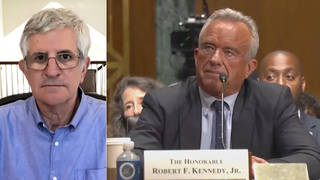
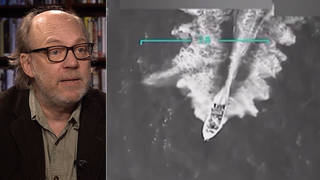
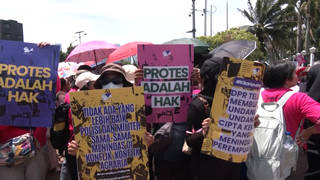
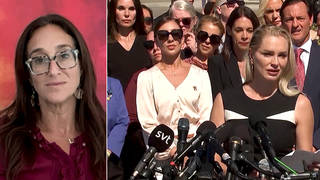






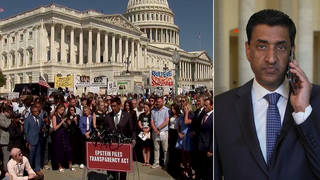
Media Options